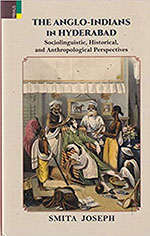The book is a welcome addition to the field of the history of sociolinguistics and sociolinguistic anthropology. Though the book is very short with 122 pages of analysis, the history of sociolinguistics is accurately presented with a nuanced socio-cultural understanding of the Anglo-Indian community in Hyderabad. Divided into six chapters, including the introduction and conclusion, there are two very good chapters wholly dedicated to the sociolinguistic history of slang and the origin of European names among the surviving Anglo-Indian community in Hyderabad, a city in Telangana State in India, and one chapter on the sociolinguistic history of Kerala Syrian Christians in the book.
In the introduction, the author discusses the questions of ‘ethnicity’ and ‘race’, and historically, how they originated from different layers of sociolinguistic configurations from colonial to contemporary India. The book explains how the distribution of slang can be identified in certain societies, though the social acceptability of the slang was considered to be of low status in any mainstream culture. In the second chapter, the author discusses the global context of slang in different countries across ethnicities, gender and age groups, which resulted in the linguistic characterization of slang. The author also argues that slang emanated through two forms: one naturally came out of spontaneous conversations and the other through artificial slang. Unlike naturally occurring slang, artificial slang was fashioned out of rules in many cultures and societies.


Wow, marvelous weblog structure! How lengthy have you
been blogging for? you make running a blog look easy.
The total look of your website is great, as smartly as the content!
You can see similar here sklep internetowy